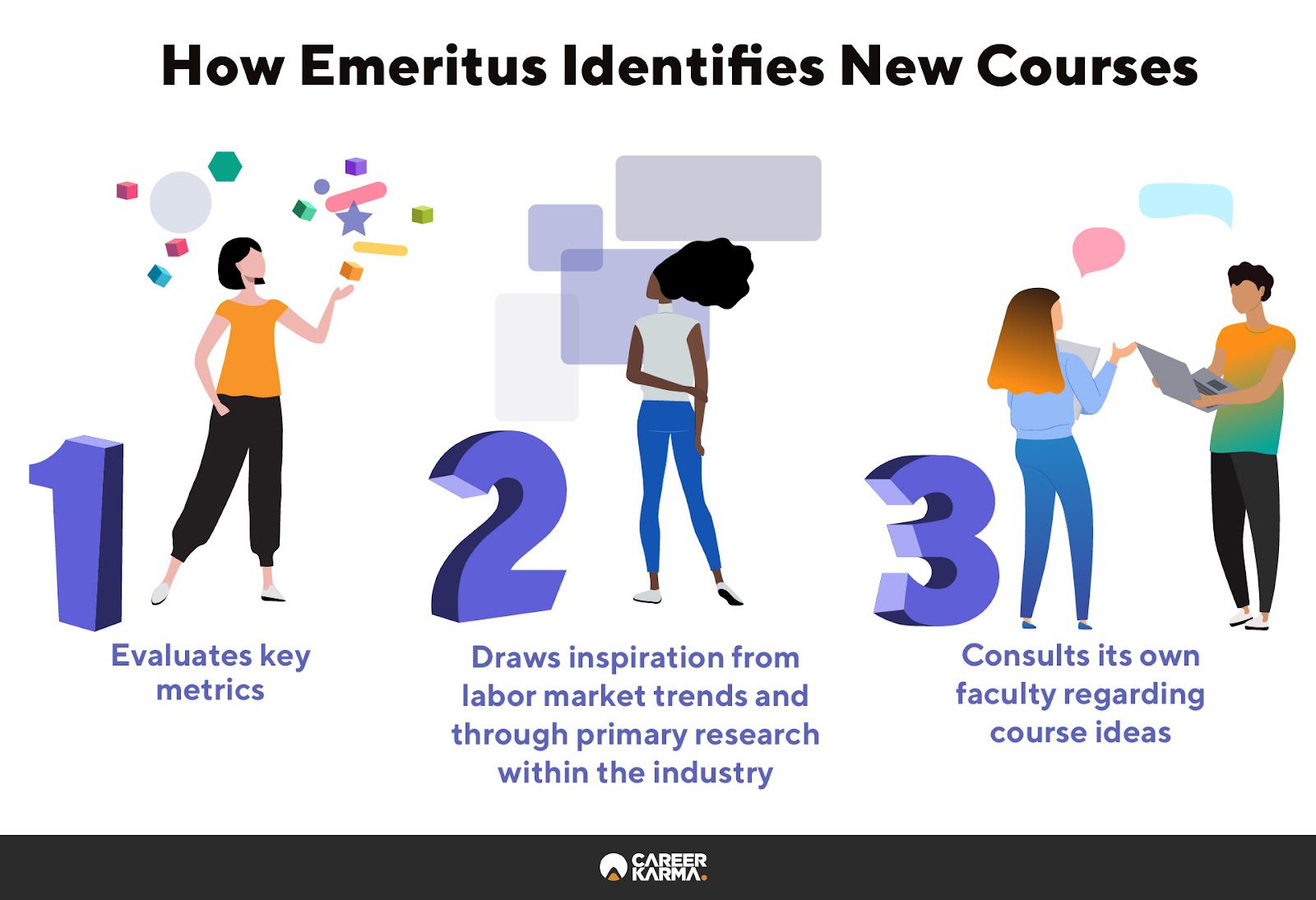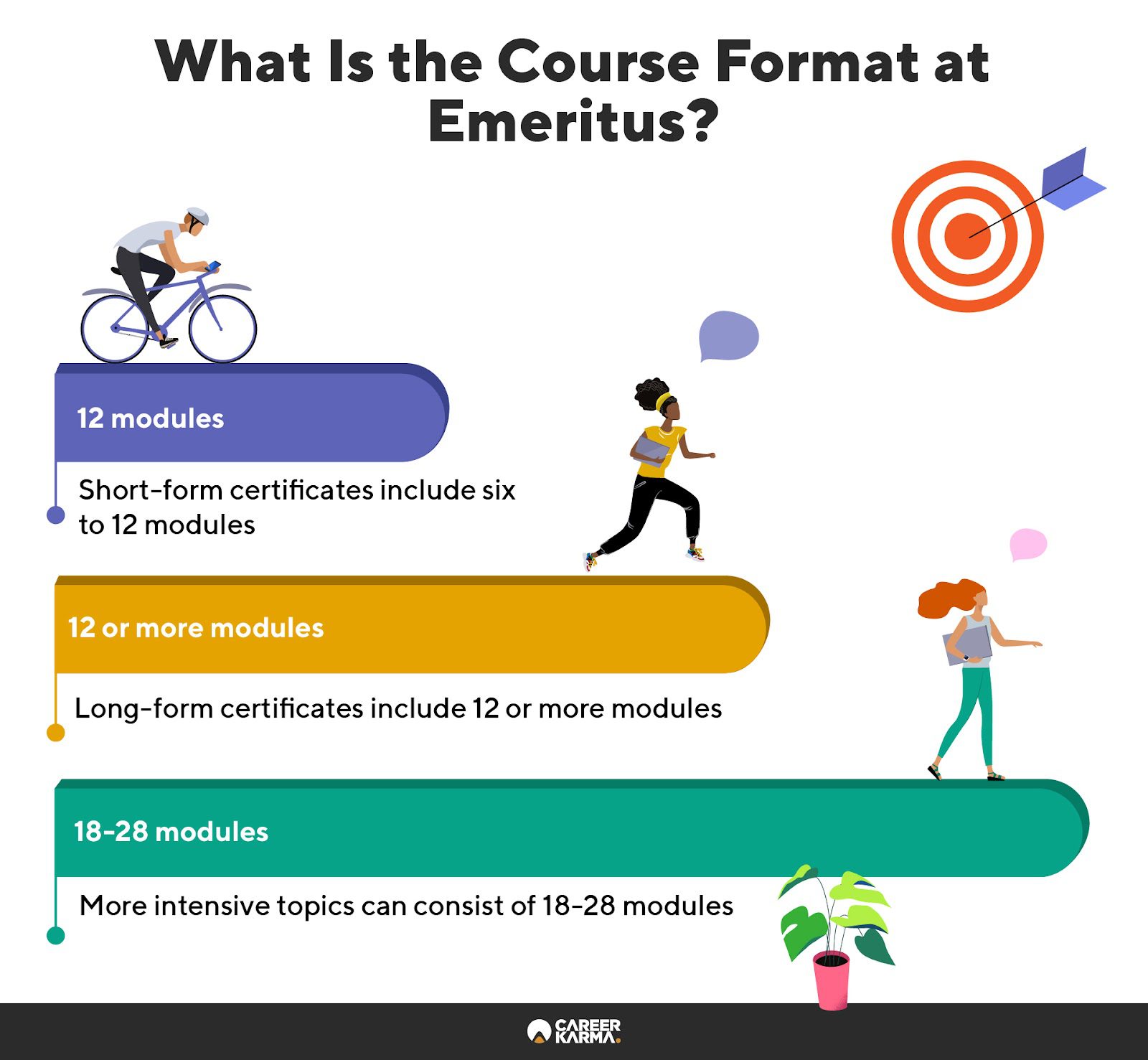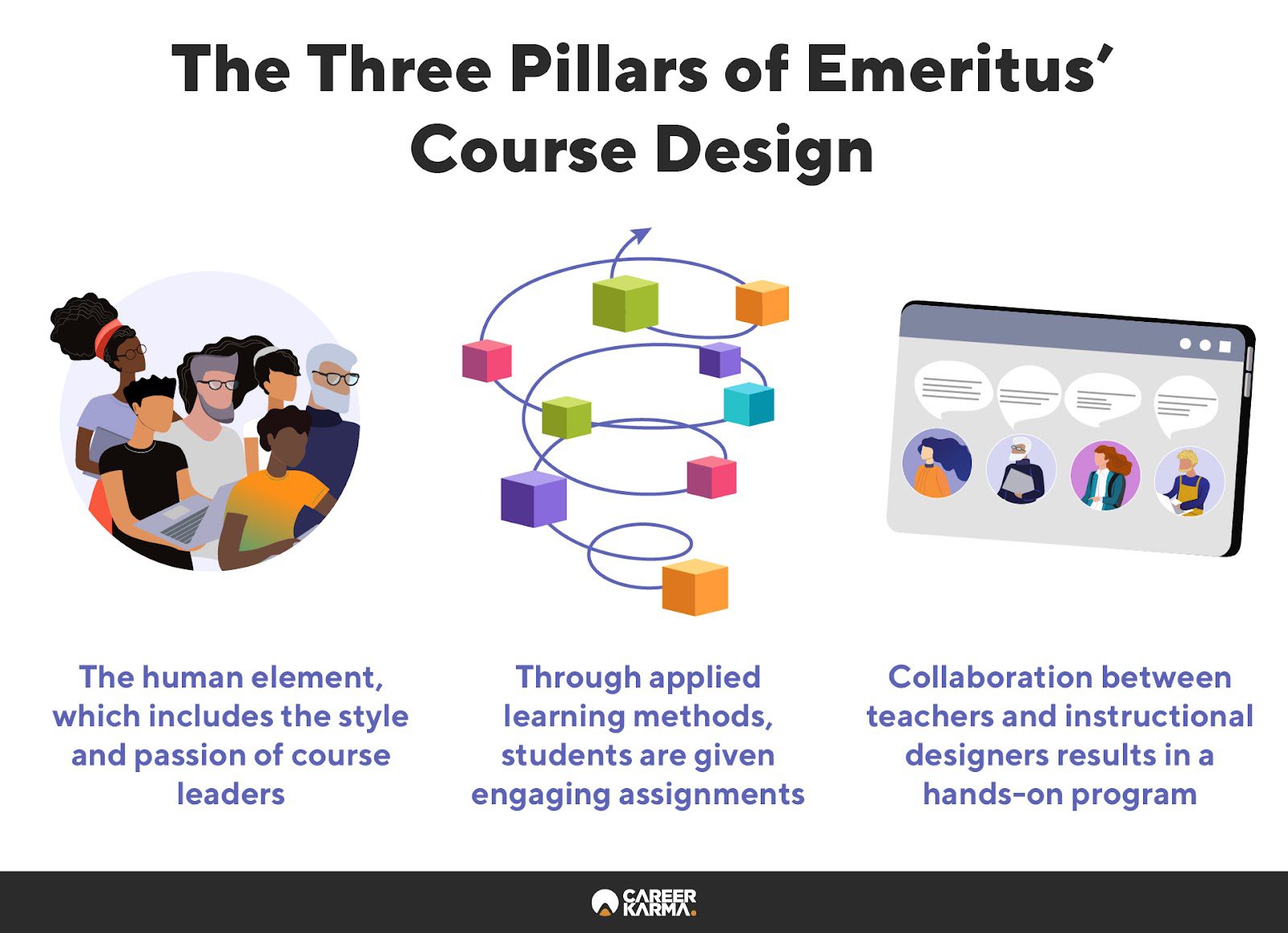The rise of online courses has been a gift to learners worldwide. Whether you want to change careers or you just want to improve your skills in your current field, there are hundreds of options just a few clicks away. However, while online courses are in abundance today, they’re known to fall short on too many counts. Some barely explore key topics rigorously, while others exhibit poor quality of instruction.
Emeritus breaks away from this stereotype by partnering with world-renowned universities and their leading professors to design courses across a world of disciplines. Their curricula design aims at outclassing the regular college quality to present the best course work from the world over.
The process of building these courses is far more complex than sending a few emails back and forth. Emeritus’ Instructional Design Team works closely with professors over several months to build a tailor-made course without any extra fluff. Every course is different, with professors giving attendees the same quality instruction they’ve passed on to university students in successful positions.
We’ve spoken with Lisa Brem, the Director of Design at Emeritus, to give you a better sense of how these courses come together and what makes them so special.
Emeritus builds each course in a methodical process to give students the best experience possible as they embark on an upskilling or reskilling journey.
Discover more about Emeritus and its offerings today.What Is Emeritus?
Emeritus is an online education platform that provides quality education in various tech and business disciplines, partnering with top universities around the world. Each Emeritus course and bootcamp features top faculties from its partner school, outstanding course designs, and impressive outcomes. Whether your interest is in business management, leadership, data science, coding, or entrepreneurship, this platform’s got you covered.
For example, you can take an online Digital Transformation Course from UC Berkeley to help bring your business into the 21st century. What if you’re not at the management level, and you’re looking to start a new career? If you’ve got a passion for graphic design or feel like you’re a great communicator, then maybe Advertising and Marketing Communication Strategy from Northwestern’s Kellogg School of Management is more up your alley.
Emeritus has several courses that address different levels of multiple industries. And they don’t build them alone.
How Does Emeritus Build Its Online Courses?
The course structure at Emeritus is very close to the university experience, according to Lisa Brem, the Director of Design for Short Courses at Emeritus. “Learners can interact with real people and wrestle with real issues that will give them insights and knowledge they can apply to their work,” Lisa said.
Her resume speaks for itself. She has significant experience in academia, and much of that experience consists of directly aiding or overseeing instruction at the highest levels. In about the first 10 years of her career, Lisa worked with the Harvard Business School, helping faculty develop case studies, teaching notes, simulations, and book chapters. For the next seven, she worked as the Director of Teaching and Learning at Harvard Law School.
After nearly two decades of working at Harvard, she joined Emeritus.
Step 1. Identifying New Courses

Because what learners need are constantly changing, Emeritus looks at a few key metrics when identifying new courses to offer. “Our market research and product development team is continuously looking for the next big thing or essential skills to develop in the market,” Lisa said. “Our program design is based on learning outcomes, and we work backward from there.”
According to Debajeet Das, Regional Director of the Product Team, ideas can come from anywhere.
“Inspiration is drawn from labor market trends like job data, skill gaps, and degree conferrals,” Debajeet said. “But we also draw from primary research within the industry, such as trends and developments in business, technology, and innovation, along with interviews, surveys, and industry input.”
In addition to their own research, the team also relies on ideas from their own faculty.
“[The Product Team] also closely studies faculty research areas and identifies the type of courses that fit well with the university brand,” Debajeet said. “The course ideas undergo a rigorous filtering process, where only the ideas with significant demand and large total addressable market make the cut.”
Step 2. Determining Course Format

After the Product Team has identified a possible course, Emeritus works closely with its partners to develop the program. Each course can end up being one of five options, according to Lisa.
Short-form certificates include six to 12 modules, while long-form certificates consist of 12 or more modules. Learners should expect to spend four to six hours on each module in these courses. More intensive topics may require a bootcamp setting, where students take on 18 to 28 modules that require 15 to 20 hours of study per module.
Senior Executive Program Online (SEPO) courses last for 16 to 20 modules and require three to five hours of studying each. These courses also include the student’s choice of electives which require learners to spend four to six hours on each module.
Once both Emeritus and the university in question decide on a format, the next step is to craft the learning experience.
Step 3. Building the Course

“Once we start working with faculty, we integrate insights from these three pillars for a unique learning experience: the human element, applied learning, and collaboration between faculty and instructional designers,” Lisa said.
The human element of the course takes the style and passions of course leaders into consideration. Students receive information in small sections that are easier to digest, and they are also given personalized feedback to help them grow. The hybrid asynchronous/synchronous structure is also created for busy students, who learn from recorded materials as well as live lectures while building a close community with their peers.
Applied learning is the process of giving students engaging assignments that help them understand the material instead of simply memorizing it. Students receive playbooks and practice simulations of real professional events that they may encounter in their careers. Students learn how to handle these situations with real-life examples and case studies while also hearing industry perspectives.
Collaboration delivers the important content at the core of each course. Emeritus works with upper echelon academic minds and implements best practices in instructional design to build riveting courses. These courses include engaging videos with high production values to make learning easier, and a learner-centric UX to keep learners coming back.
With these three pillars in mind, the work begins.
“In the 25 weeks that follow, we focus on crafting a course that adds value to a learner’s professional life by aligning their learning goals with all the elements in the course,” Lisa said.
Step 4. Backward Design Methodology and the Quality Matters Project
The Backward Design Methodology (BWD) and the Quality Matters Project (QM) are two aspects of course design that Karen Mahon, Director of Design at Emeritus, introduced to the company. These principles help Emeritus design courses that outclass the competition and make it easy to choose the brand over others in the market.
“As the name suggests, the Backward Design Methodology is the process of designing courses by identifying learning outcomes and then working backward,” Karen said. “We identify the inputs required for those outcomes. This design method is effective in developing instruction for learners of all ages. Using BWD, we craft unique, interactive learning experiences that include a combination of assessments, hands-on activities, skill applications, and more.”
Quality Matters Project works similarly by giving Emeritus a strong rubric to follow while crafting courses.
“QM is a global organization focused on providing quality standards for online and innovative digital teaching and learning environments,” Lisa said. “The rigorous QM criteria ensure quality standardization for courses to any learner who is invested in upskilling and reskilling.”
By ensuring that each course follows QM’s strict principles, Emeritus ensures that students only learn of courses once they pass the organization’s own high standards. However, like everything at Emeritus, the most important part of the process is relationships. In this case, the relationship between the organization and the faculty that’s crafting the course.
“We really take a ‘handcrafted’ approach to the work we do,” Lisa said.
Find a Trustworthy Online Course Today
Emeritus offers quality courses created by leading minds in their fields that are built in a patient and painstaking process. The organization doesn’t rush any course, taking slightly over two years to ensure that the course value matches what students would expect from these well-known universities and their faculties.
If you’re interested in learning more about what the platform has to offer firsthand, visit the Emeritus site today and find a course that fits your needs.
About us: Career Karma is a platform designed to help job seekers find, research, and connect with job training programs to advance their careers. Learn about the CK publication.




